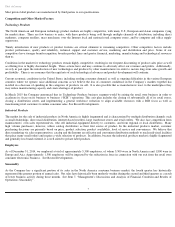CompUSA 2014 Annual Report Download - page 20
Download and view the complete annual report
Please find page 20 of the 2014 CompUSA annual report below. You can navigate through the pages in the report by either clicking on the pages listed below, or by using the keyword search tool below to find specific information within the annual report.
Changes in our income tax expense due to changes in the mix of U.S. and non-
U.S. revenues and profitability, changes in tax rates or
exposure to additional income tax liabilities could affect our profitability. We are subject to income taxes in the United States and various
foreign jurisdictions. Our effective tax rate has been in the past and could be in the future adversely affected by changes in the mix of
earnings in countries with differing statutory tax rates, restrictions on utilization of tax benefits, changes in the valuation of deferred tax
assets and liabilities, changes in tax laws or by material audit assessments. The carrying value of our deferred tax assets is dependent on
our ability to generate future taxable income in those jurisdictions. In addition, the amount of income taxes we pay is subject to audit in
our various jurisdictions and a material assessment by a tax authority could affect our profitability. During 2014 the Company recorded
non-cash valuation allowances against the deferred tax assets of its subsidiary in the U.K. of approximately $1.7 million.
A change in accounting standards or practices can have a significant effect on our reported results of operations. New accounting
pronouncements and interpretations of existing accounting rules and practices have occurred and may occur in the future. Changes to
existing rules may adversely affect our reported financial results.
Richard Leeds, Robert Leeds, and Bruce Leeds (each are brothers and directors and executive officers of the Company), together with
trusts for the benefit of certain members of their respective families and other entities controlled by them, control approximately 70% of
the voting power of our outstanding common stock. Due to such holdings, the Leeds brothers together with these trusts and entities are
able to determine the outcome of virtually all matters submitted to stockholders for approval, including the election of directors, the
appointment of management, amendment of our articles of incorporation, significant corporate transactions (such as a merger or other sale
of our company or our assets), the payments of dividends on our common stock and the entering into of extraordinary transactions.
Further, a s a "controlled company" under NYSE rules, the Company has elected to opt-
out of certain New York Stock Exchange listing
standards that, among other things, require listed companies to have a majority of independent directors on their board; the Company does
however currently have an independent Audit, Compensation Committee and Corporate Governance and Nominating Committees.
Our common stock is currently listed on the NYSE and is thinly traded. Volatility of thinly traded stocks is typically higher than the
volatility of more liquid stocks with higher trading volumes. The trading of relatively small quantities of shares of common stock by our
stockholders may disproportionately influence the price of those shares in either direction. This may result in volatility in our stock price
and could exacerbate the other volatility-
inducing factors described below. The market price of our common stock could be subject to
significant fluctuations as a result of being thinly traded.
None.
17
Table of Contents
•
Our profitability can be adversely affected by changes in our income tax exposure due to changes in tax rates or laws, changes in our
effective tax rate due to changes in the mix of earnings among different countries, restrictions on utilization of tax benefits and changes in
valuation of our deferred tax assets and liabilities.
•
Changes in accounting standards or practices, as well as new accounting pronouncements or interpretations, may require us to account
for and report our financial results in a different manner in the future, which may be less favorable than the manner used historically.
• Concentration of Ownership and Control Limits Stockholders Ability to Influence Corporate Actions
•
Risk of Thin Trading and Volatility of our Common Stock Could Impact Stockholder Value
Item
1B.
Unresolved Staff Comments.
























